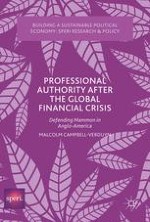This book challenges amoral views of finance as the leading realm in which mammon – wealth and profit – is pursued with little overt regard for morality. The author details an enhanced ethical emphasis by leading Anglo–American professionals in the aftermath of the 2007–8 global financial crisis. Instead of merely stressing expert knowledge, professionals sought to overcome the alleged impossibility of serving “two masters” – mammon and God – by embracing religious finance, socio-economic inequality, sustainability and other overtly moral issues. Continuities in liberal values and ideas, however, limited the impact of this enhanced ethical emphasis to restoring the professional authority, as well as to more fundamentally reforming of Anglo–American finance following the most severe period of instability since the Great Depression. Providing a nuanced account of post-crisis change and continuity in a crucially important industry, Campbell-Verduyn advances a dynamic, process-based understanding of authority that will appeal to international political economists and sociologists alike.
